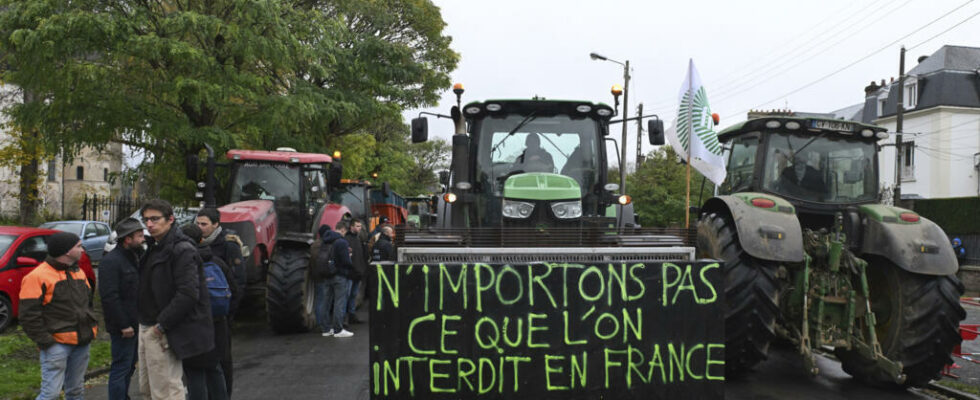This Tuesday, November 26, the National Assembly showed its support for the government of Michel Barnier in its opposition to the proposed free trade agreement between the EU and Mercosur, as envisaged by the European Commission.
4 mins
By 484 votes to 70, French deputies approved, by a non-binding vote, the government’s position in the negotiations between the European Union and the Mercosur. This result gives the executive a “ democratic mandate » which will strengthen its “ legitimacy to defend the voice of “no” before the Commission and the European Council », welcomed the Minister of Foreign Trade, Sophie Primas. A Senate vote on the same subject is expected this Wednesday.
“ Under current conditions “, this draft agreement between the European Union and the Mercosur countries (Brazil, Argentina, Uruguay, Paraguay) does not guarantee ” fair conditions of competition for our farmers », Underlined to the deputies the Minister of Agriculture Annie Genevard.
During the long debate devoted to this flammable subject, all political groups, without exception, expressed their rejection of the trade agreement, but with nuances. Thus the deputies of the “common base” supported the government’s position according to which the agreement could be amended, because it is not necessary “ oppose in anticipation and in principle any free trade agreement », as summarized by Annie Genevard. Others, notably rebellious and environmentalist elected officials, insisted on their refusal of any agreement, whatever it may be, “ neither today nor tomorrow », as the ecologist Marie Pochon said. “ There is no good EU-Mercosur agreement possible », Also insisted Arnaud Le Gall (LFI).
Farmers march on Strasbourg
Alongside political progress, farmers continued to increase their actions on the ground this Tuesday. A procession of around fifty tractors from Rural Coordination, France’s second largest agricultural union, attempted to reach the European Parliament in Strasbourg to denounce the proposed free trade agreement. From 10 a.m., around fifty tractors – most of them coming from Franche-Comté – found themselves stuck between two cordons of CRS and mobile police, just a stone’s throw from the building.
Yellow hat on their heads, Paul Fritsch, president of the Grand-Est rural coordination, and his colleagues had planned to meet European deputies to convince them to oppose the draft treaty between the EU and the countries of Mercosur. An agreement which, if adopted, would subject French agriculture to unfair competition, according to him. “ These are products that come with standards that have nothing to do with ours. Neither social standards since we don’t have the same salaries, nor health standards since they use products that have been banned here for years », he argued on the microphone of our correspondent in Strasbourg, Wyloën Munhoz-Boillot.
Also readFree trade agreement with the EU: Mercosur side, who loses and who wins?
In the afternoon, around ten French MEPs from all sides came to meet the demonstrators. Socialist François Kalfon assured them that France was seeking to rally a blocking minority against the agreement with Mercosur. “ The work we do is to seek out other countries one by one, he explained. Austria has already created some form of opposition. Italy said how much the agricultural aspect did not suit it. But we continue our work of persuasion. » For her part, Manon Aubry, president of the left group in the European Parliament, called on farmers to continue the mobilization: “ The stronger the anger and agricultural mobilization, the more pressure we will be able to put on. »
For its part, the majority alliance FNSEA-Young Farmers has launched new actions throughout France until Thursday, aimed at “ anything that hinders the lives of farmers “, in particular administrations (prefectures, water agencies, etc.), explained on France 2 the president of the FNSEA Arnaud Rousseau.
France is in any case no longer alone in its refusal: the Polish government adopted a resolution on Tuesday proclaiming that Warsaw would not accept the agreement ” in this form “, in particular because of ” concern for Polish farmers and food security “. “ Diplomatic actions are underway to constitute a minority which will prevent the entry into force of the agreement », Underlined Deputy Prime Minister Wladyslaw Kosiniak-Kamysz.
Also readAgreement with Mercosur: in France, an agricultural mobilization against a backdrop of union rivalries
